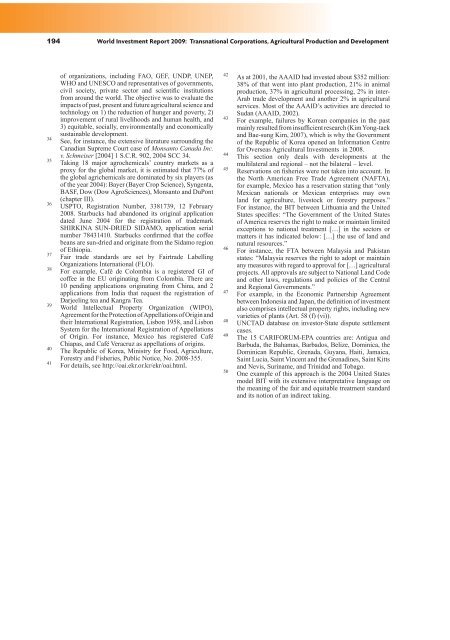World Investment Report 2009: Transnational Corporations - Unctad
World Investment Report 2009: Transnational Corporations - Unctad
World Investment Report 2009: Transnational Corporations - Unctad
Create successful ePaper yourself
Turn your PDF publications into a flip-book with our unique Google optimized e-Paper software.
194 <strong>World</strong> <strong>Investment</strong> <strong>Report</strong> <strong>2009</strong>: <strong>Transnational</strong> <strong>Corporations</strong>, Agricultural Production and Development<br />
34<br />
35<br />
of organizations, including FAO, GEF, UNDP, UNEP,<br />
WHO and UNESCO and representatives of governments,<br />
������ ��������� �������� ������� ���� ���������� �������������<br />
from around the world. The objective was to evaluate the<br />
impacts of past, present and future agricultural science and<br />
technology on 1) the reduction of hunger and poverty, 2)<br />
improvement of rural livelihoods and human health, and<br />
3) equitable, socially, environmentally and economically<br />
sustainable development.<br />
See, for instance, the extensive literature surrounding the<br />
Canadian Supreme Court case of Monsanto Canada Inc.<br />
v. Schmeiser [2004] 1 S.C.R. 902, 2004 SCC 34.<br />
Taking 18 major agrochemicals’ country markets as a<br />
proxy for the global market, it is estimated that 77% of<br />
the global agrichemicals are dominated by six players (as<br />
of the year 2004): Bayer (Bayer Crop Science), Syngenta,<br />
BASF, Dow (Dow AgroSciences), Monsanto and DuPont<br />
(chapter III).<br />
36<br />
USPTO, Registration Number, 3381739, 12 February<br />
2008. Starbucks had abandoned its original application<br />
dated June 2004 for the registration of trademark<br />
SHIRKINA SUN-DRIED SIDAMO, application serial<br />
������� ���������� ���������� ��������� ����� ���� �������<br />
beans are sun-dried and originate from the Sidamo region<br />
of Ethiopia.<br />
37<br />
Fair trade standards are set by Fairtrade Labelling<br />
38<br />
Organizations International (FLO).<br />
For example, Café de Colombia is a registered GI of<br />
coffee in the EU originating from Colombia. There are<br />
10 pending applications originating from China, and 2<br />
applications from India that request the registration of<br />
Darjeeling tea and Kangra Tea.<br />
39<br />
<strong>World</strong> Intellectual Property Organization (WIPO),<br />
Agreement for the Protection of Appellations of Origin and<br />
their International Registration, Lisbon 1958, and Lisbon<br />
System for the International Registration of Appellations<br />
of Origin. For instance, Mexico has registered Café<br />
Chiapas, and Café Veracruz as appellations of origins.<br />
40<br />
The Republic of Korea, Ministry for Food, Agriculture,<br />
Forestry and Fisheries, Public Notice, No. 2008-355.<br />
41<br />
For details, see http://oai.ekr.or.kr/ekr/oai.html.<br />
42 As at 2001, the AAAID had invested about $352 million:<br />
38% of that went into plant production, 21% in animal<br />
production, 37% in agricultural processing, 2% in inter-<br />
Arab trade development and another 2% in agricultural<br />
services. Most of the AAAID’s activities are directed to<br />
43<br />
44<br />
Sudan (AAAID, 2002).<br />
For example, failures by Korean companies in the past<br />
���������������������������������������������������������<br />
and Bae-sung Kim, 2007), which is why the Government<br />
of the Republic of Korea opened an Information Centre<br />
for Overseas Agricultural <strong>Investment</strong>s in 2008.<br />
This section only deals with developments at the<br />
multilateral and regional – not the bilateral – level.<br />
45 � ���������������������������������������������������������<br />
the North American Free Trade Agreement (NAFTA),<br />
for example, Mexico has a reservation stating that “only<br />
Mexican nationals or Mexican enterprises may own<br />
land for agriculture, livestock or forestry purposes.”<br />
For instance, the BIT between Lithuania and the United<br />
������������������������������������������������������<br />
of America reserves the right to make or maintain limited<br />
exceptions to national treatment […] in the sectors or<br />
matters it has indicated below: […] the use of land and<br />
46<br />
47<br />
natural resources.”<br />
For instance, the FTA between Malaysia and Pakistan<br />
states: “Malaysia reserves the right to adopt or maintain<br />
any measures with regard to approval for […] agricultural<br />
projects. All approvals are subject to National Land Code<br />
and other laws, regulations and policies of the Central<br />
and Regional Governments.”<br />
For example, in the Economic Partnership Agreement<br />
���������������������������������������������������������<br />
also comprises intellectual property rights, including new<br />
varieties of plants (Art. 58 (f) (vi)).<br />
48 UNCTAD database on investor-State dispute settlement<br />
49<br />
cases.<br />
The 15 CARIFORUM-EPA countries are: Antigua and<br />
Barbuda, the Bahamas, Barbados, Belize, Dominica, the<br />
Dominican Republic, Grenada, Guyana, Haiti, Jamaica,<br />
Saint Lucia, Saint Vincent and the Grenadines, Saint Kitts<br />
and Nevis, Suriname, and Trinidad and Tobago.<br />
50 One example of this approach is the 2004 United States<br />
model BIT with its extensive interpretative language on<br />
the meaning of the fair and equitable treatment standard<br />
and its notion of an indirect taking.

















